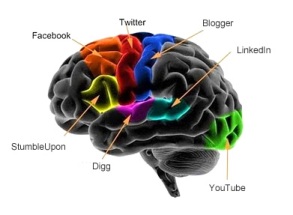For all the time we devote to social media, you would think that it would register some meaningful improvement to our lives. You would expect that social media would do something psychologically beneficial for us: elevate our mood, increase our energy, or help us get more out of the day.
But the more research that comes in, the more social media looks to be a wasteland of clickbait and sadness.
Social Media and Psychology: How to Kill Productivity and Happiness
According to a recent study in Computers in Human Behavior, personal social media use not only correlates inversely with productivity (we already knew this in our hearts) but correlates inversely with happiness as well. The correlation is true regardless of how good a multitasker you are, and regardless of how well you can focus your attention on a subject.
 The study notes that to date, we have all kinds of research on how distraction can impede someone’s performance at a task. And though it seems obvious that personal social media use would be classified as a distraction, there is not a lot of present research on whether or not social media specifically impedes performance.
The study notes that to date, we have all kinds of research on how distraction can impede someone’s performance at a task. And though it seems obvious that personal social media use would be classified as a distraction, there is not a lot of present research on whether or not social media specifically impedes performance.
However, the psychology of social media is not just about efficiency. Maybe we are willing to give up some efficiency for something that makes us happy. We must, after all, be getting something out of all the time we spend on social media; if it’s not something tangible like efficiency, then it’s something intangible like happiness.
Except that’s wrong.
Social Media and Happiness: Less (of the Former) Is More (of the Latter)
The researchers also took happiness scale evaluations during their social media usage experiment. Social media lowers happiness, and it does so in two ways.
First, it lowers happiness directly. This largely has to do with self-comparison to one’s peers. As the report hypothesizes:
Many news stories published by popular media outlets are concerned with negative impacts on happiness from social media. One story in particular, entitled ‘‘Facebook: The Encyclopedia of Beauty?’’ discusses the rampant unhappiness that can be found in college-aged females living on campus. The story gives accounts of self-esteem issues and other negative effects from over-usage of social media.
 Secondly, social media increases a sub-category of stressors that researchers our now labeling “technostress.” Technostress is defined by psychologists as “‘any negative impact on attitudes, thoughts, behaviors, or body physiology that is caused either directly or indirectly by technology.”
Secondly, social media increases a sub-category of stressors that researchers our now labeling “technostress.” Technostress is defined by psychologists as “‘any negative impact on attitudes, thoughts, behaviors, or body physiology that is caused either directly or indirectly by technology.”
This is not something that’s only experienced by people who are uncomfortable with computers and devices. The article cites a University of Edinburgh study, which found that “the more Facebook friends a user has, the more likely you are to feel stressed out by the social media.” And there is already a very good foundation of research supporting the notion that increases in stress diminish happiness. So, if social media ads stress and stress diminishes happiness, then you can get the rest.
The study revealed that personal social media use lowered productivity by way of causing distraction. This finding is in line with what’s call Distraction-Conflict Theory, which says basically that distractions cause some of the information necessary for the primary task to fall out of short-term memory. This is no surprise to anyone who’s ever used social media.
What was a surprise was that the effect was just a dramatic among poor multitaskers as it was among people who rated themselves great multitaskers. As the report puts it, “This result lends support to the common rhetoric that people are not as good at multitasking as they think they are.”
In Summary
So, in three points, here’s what all this means for us:
1. Social media makes you less productive despite how good a multitasker you think you are.
2. Social media makes you unhappy in the long run, both directly and by adding stress.
3. We’re probably still going to spend all our time on Facebook and Twitter anyway…
That last point is not from the report, but we both know it’s true.


I think we’re all particularly conditioned to check in as well… similar to the feeling some people get when they haven’t heard the news for a few days, but significantly worse. One of my friends was trying to avoid finding out some sports scores until he watched the game, so he had to avoid social media at all costs, but kept finding that grabbing his phone and checking Facebook and Instagram was automatic.
I’ve noticed in myself, that I can be completely into completing a task, and then I pause for a second and I almost always reach for my phone.